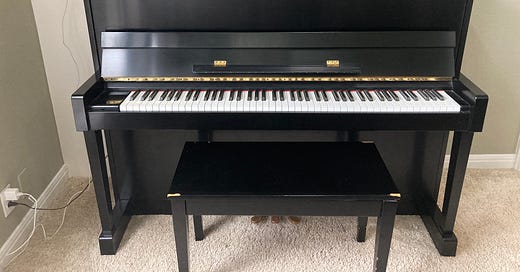During his teenage years, he aspired to someday round into a rewarding career as a modern American composer of high Classical music. He would take the name Liberatu and be known the world over as the artist who brought the baroque stylings of the legends back into the eye of the unkempt hurricane that is popular culture. He would not be in it for the fame or the accolades; in fact, he would casually shrug these parts of the job off as necessary fetters borne by a man of his mind. The common superlative that would come to be synonymous with “Liberatu'' would be “peerless.” Not “greatest,” no. The masters of old could bicker over that one. Merely “peerless,” an adjective much more localized in time, and fittingly so, because who in the genre would be able to put their body of work, in the 21st century, on any pedestal within feet of the great Liberatu’s?
He would be featured on the late night talk shows but not to talk, simply to play. To come onstage unaccompanied, perform 20+ minutes of original composition to a breathless crowd of ordinarily attention-defficient American consumers who would, as a single mass, refrain from any of their constant compulsions (checking their cell phones, scratching the dandruff out of their mistreated scalps, touching the begoosebumped leg of their loved one) for the duration of the performance. His piano would go silent, he would bow his head out of respect for the music, the silly cog who called himself host of the program would be shown on-air for a moment with his lower jaw in the vicinity of his collarbone, and an advertisement about bundling your home and auto insurance would roll before the at-home viewers realized they had lives outside of those sounds.
In his late stage, after he’d begrudgingly endured the media cycles and press tours, after he’d been photographed strategically with beautiful and notorious women, after he’d welcomed a chosen few pupils of his own into the league of virtuosity, he would become a recluse and leave the piranhas unsated. Two more great works, at least, would be quietly released under his name, and each would invariably become critical and popular sensations without a single cent (or thought) put towards its promotion. Finally, (and this would be some time around his mid-50’s) the music would stand for itself. And what more could a true artist ask for?
So he began practicing the piano quite a bit. At least a couple times a week. But most of the work, really, had to do with getting into the mindset of an artist, planning for all the stuff around the periphery. Curating, for instance, a list of influences to tell the reporter who was one day certain to ask, and practicing the cadence he’d use to deliver it, so it sounded like it was coming off the top of his head in no particular order. Penning the blurb for the pamphlets of his retrospective at Madison Square Garden, remarking on how humbled he felt to be surrounded by such important figures of art and industry, all of whom there to celebrate his oeuvre. Looking at himself in the mirror, extensively, imagining the angles the photographers would highlight in the album cover shoots.
And so, when he finally felt he’d hammered out all the details of his path, the boy who would one day become Liberatu worked up the courage and shared his dream, in broad strokes, with a friend of his who he considered a sensitive, trustworthy confidant. He included such details as the plot of land he intended to purchase on the Oregon coast and fill with a diverse community of artists and playful souls. He made sure to let his friend know that no one’s generosity or friendship these formative years would be forgotten down the line when he would have more money than it would take to line the streets of London with gold.
Once he’d laid it all out, his buddy, maybe only part-way listening, said, “Wow. So you’re trying to become a vampire? No shit…”
Maybe the name needed some work, then.



Brilliant. Also when the lights fade and fame dims, you can go into your coffin and wait 100 years then come out and do it all again :)